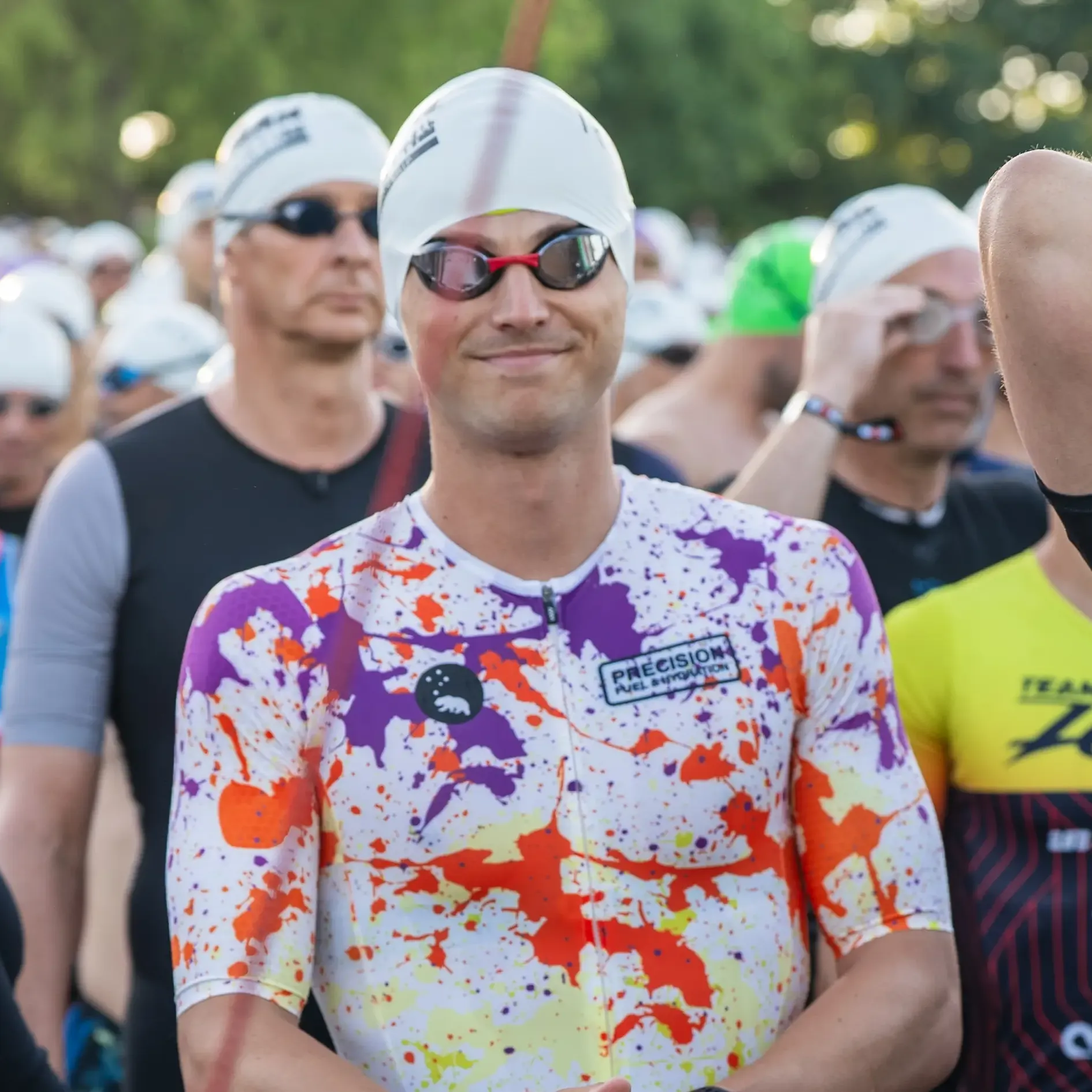
Raff Hussey
IRONMAN® Frankfurt
Raff's headline numbers
Raff's strategy
Fueling
Carbohydrate is the main fuel you burn when racing. Failing to fuel properly is a leading cause of underperformance in longer races.
Pre-race Fueling: A Sports Scientist at heart and with years of experience at PF&H, Raff knows how to practice what he preaches. He planned and executed a textbook carb load in the 48 hours before race day. Based on his body weight, the scientific guidelines for carb loading (8-12g/kg) suggest Raff should aim to consume 592g - 888g per day to maximise glycogen stores (the body’s stored form of carbohydrate). Raff did just that, consuming ~732g (9.9g/kg) on Friday and ~625g (8.5g/kg) on Saturday. His menu featured familiar meals, high in easily digestible carbohydrates such as pastries, pancakes, bagels and pasta, alongside PF Carb Only Drink Mix, PF 30 Chews and energy bars to help reach his carb intake targets without feeling too full or overeating. He followed this up by meeting the recommendations of 1-4g/kg in the 1-4 hours before the start on race morning, eating ~3g/kg around 2 hours 40 minutes before the early start to top up his liver glycogen stores.
Race Fueling: Three years after his debut IRONMAN® at Maastricht, Raff approached his second IRONMAN® with an improved fueling strategy both pre-race and during the event. Despite hot conditions on race day (highs of 36℃ / 97°F), he improved his time by over an hour, an impressive feat undoubtedly supported by his improved fueling intake and consistency.
Raff’s fueling numbers on the bike were very similar from 2022 to 2025 (~104g/h vs ~108g/h), but this time he simplified delivery using PF 300 Flow Gel in both a Flow Flask and Flow Bottle. Impressively, he was still able to consume this high quantity of fuel in the heat and, despite dropping his half full Flow Bottle on the Frankfurt cobbles, expertly replacing his lost carbs with on course gels and half a banana. The biggest improvement came on the run, where he again utilised Flow Gel and PF 30 Caffeine Gels to sustain high energy levels, averaging ~13g/h more compared to Maastricht (~82g/h vs ~95g/h) to help support his first sub-4 hour IRONMAN® marathon.
Hydration
Taking on board an appropriate amount of fluid and sodium is essential to maintaining blood volume and supporting the cardiovascular effort needed to perform on race day.
Whilst the absolute amount of sodium and fluid consumed per hour is important, it’s critical to consider these in relation to each other. This is known as 'relative sodium concentration' and it’s expressed in milligrams per litre (mg/L). How much sodium you’re taking in per litre of fluid is more important than the absolute amount taken in per hour.
Sweat sodium concentration (mg/L) is largely genetically determined and remains relatively stable. Knowing how salty your sweat is enables you to replace a good proportion of your sweat losses, which can range from 200-2,000mg/L.
Whilst Raff’s losses are on the low side, getting his hydration strategy right is still crucial when it’s hot and/or humid as his higher sweat rate in these conditions can result in significant net losses over the duration of a race.
Learn moreRaff made significant changes to his hydration strategy from IRONMAN® Maastricht, doubling his fluid intake on the bike and drinking ~19% more per hour on the run to account for his significantly higher sweat losses in much warmer conditions. By picking up additional bottles of PH 1000, he was able to scale up his fluid and sodium intake in tandem to match his sweat sodium losses, helping to maintain his performance and avoid hydration-related issues while others faded on the run.
Caffeine
Beyond the Three Levers of Performance (carb, sodium and fluid), caffeine is one of only a few substances that is proven to improve performance for most endurance athletes as it can help stave off mental and physical fatigue.
In his 2025 race, Raff took ~100mg more caffeine than in 2022. Consuming a total of six PF 30 Caffeine Gels and a small amount of on course cola, he surpassed the general 3-6mg/kg recommended dose. Given recent evidence suggests that acute caffeine doses above 5mg/kg could negatively impact thermoregulation in the heat and potentially negate the performance benefit of the stimulant, Raff may want to consider bringing this in line with the recommendations in races of similarly hot conditions.
How Raff hit his numbers
Here's everything that Raff ate and drank on the day...
Raff's weapons of choice
Final thoughts
Raff's full stats
Data Confidence?
There is an adequate level of accuracy in the data collected and the numbers reported. The athlete manages to recall what they ate and drank including most specifics (brands flavours quantities plausible estimations of volumes). However there are estimations made within the data which affect the overall confidence level in the data reported.